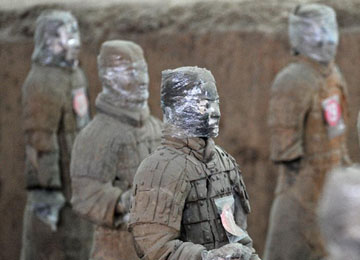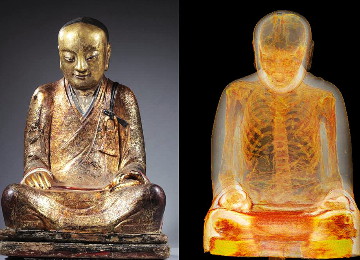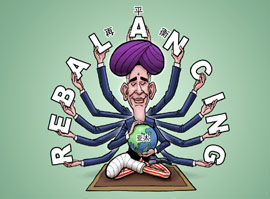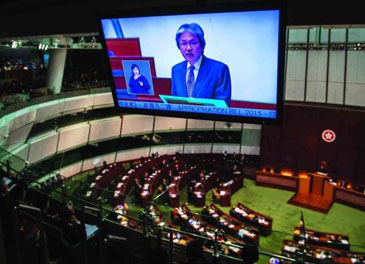Xinhua Insight: Gloom for Hebei as steel loses shine
移动用户编辑短信CD到106580009009,即可免费订阅30天中国日报双语手机报。
SHIJIAZHUANG, Feb. 27 (Xinhua) -- Steelmakers in north China's Hebei Province, which produces at least one fifth of the country's total crude steel, are struggling to survive through industrial reforms amid overcapacity and pollution concerns.
A slight yet nerve-wracking 0.6-percent drop in crude steel output last year, the first drop since the year 2000, has left companies pessimistic about their destiny in the Chinese Year of the Ram, which began last Thursday.
Backed by its rich iron ore reserves, Hebei has for decades been a leading steel producer in China. Its annual output has surpassed that of Japan, the world's second-largest steel-producing country.
Last year, crude steel output in Hebei added up to 185 million tonnes, 22 percent of China's total 823 million tonnes.
As demand keeps shrinking and signs of overcapacity become more apparent, the central government has decided to cut China's steel and iron production by 80 million tonnes in three years.
The decision came as a heavy blow to local steelmakers, who were already struggling with deficits and pollution accusations: of the 10 most polluted Chinese cities last year, seven were in Hebei Province.
Gone are the days when the steel mills' production lines were compared to "banknote printers" as steelmaking was more lucrative than any other trade, said Kong Delin, a steel plant manager.
His company, once a cash cow in Qianan, a county-level city in Hebei, has been closed for more than a year. Its former workshops are deserted and the 450-cubic-meter furnace that used to be a great source of pride for locals has been reduced to a pile of waste iron.
DOWN AND OUT
Kong, 40, had tears in his eyes as he recalled the company's short-lived glory.
Jianyuan Steel and Iron Co. Ltd. was founded in 1992 amid soaring global demand. Kong joined the company in 2002, working his way up from a young engineer to deputy general manager.
"In our heyday, the market was so hungry for steel that billets were loaded onto container trucks immediately after they came out of the furnace," he said.
"People joked that steel company bosses carried huge sacks of cash to buy luxury cars, and if the sales assistant did not show due respect, they'd buy the car showroom."
By the time Kong joined Jianyuan, the company had helped the underdeveloped Qian'an County to shake off poverty and become one of the 100 richest counties in China.
But its glory did not last long. Business began to slump in 2008, under the impact of the international financial crisis. In 2012, steel prices dropped drastically to the 1990s level.
Locals applied gallows humor to the degree to which profits generated by each tonne of steel had shrunken over the past decade.
"Ten years ago, it was equivalent to the price of a cell phone [about 3,000 yuan or 480 U.S. dollars]. After 2010, it was worth about the same as one kg of pork [about 30 yuan] and today, it is dirt cheap," said Kong.
By 2013, his company was deep in the red, reporting losses of at least 10 million yuan every month.
Kong himself was in charge when the company was forced to close down all its facilities, dismantle the furnace and put an end to its steel legend in 2013.
SACRIFICE
The central government has demanded China's steel output be cut by 80 million tonnes by the end of 2017. Hebei, as the largest producer, should cut production by 60 million tonnes.
The production cut would shake many related industries and affect the livelihoods of at least 600,000 people.
In Shucun Township of Wu'an City, a leading steel base, the past two years have seen the closure of 237 lime kilns, about 70 percent of the city's total.
Lime is a major ingredient in steelmaking, but lime kilns are heavy polluters.
Almost the entire Shucun Township was fed by limemaking. When kilns were bulldozed one after another, thousands of workers were left not knowing where they should go for a living.
The government, too, paid a price. Last year, Hebei Province posted a GDPgrowth of 6.5 percent, the third-lowest growth rate among all Chinese provinces.
By the end of 2017, production cuts in the steel sector will have reduced the province's tax revenue by 50 billion yuan.
SEEKING SURVIVAL
Ye Jinbao, founder of the first private steel plant in Qianan, evaded the steel industry's recession: he sold the plant in its heyday and tried his luck in biomedicine.
"It's still too early to tell if I've jumped from the frying pan into fire," said Ye, whose 400-million-yuan investment in vaccine and drug development has not yielded any profit. His first vaccine product, developed in 2006 and costing 20 million yuan, is still waiting for the clinical tests needed before it is approved for sale.
Though some plants have closed down altogether, the absolute majority of steelmakers are still clinging on, struggling to survive by upgrading their products and seeking new revenue streams.
Jinan Steel in Wu'an City has seen a ray of hope in teaming up with Fermat Machinery to produce digitally-controlled machine tools. But the city government's decision to move it and five other plants from downtown into a suburban industrial park by 2017 was a heavy blow.
Relocating is an expensive business for steel plants, as 90 percent of their facilities can not be moved and have to be rebuilt from scratch in the new location.
"I hope we can survive with financial and policy support from the city government," said Wei Kaozeng, a senior executive with Jinan Steel.
The industry's gloomy outlook has forced companies and governments to seek more sustained development.
"The city's iron ore reserves may last for another 50 years," said Li Zhong, Party chief in Qianan. "It's crucial to find more rational ways of development without exhausting our resources."
Powerful state companies are rapidly upgrading technologies to cut emissions.
The Tangshan steel plant of Hebei Steel and Iron Group, a 72-year-old state firm, has set up one of the largest sewage treatment facilities in north China and stopped using groundwater in its steel production.
The plant has also applied new technologies to cut other waste emissions and reduce noise.
"Survival calls for transformation and involves great pain," said Zhou Benshun, secretary of the Hebei Provincial Party Committee. "But there's no turning back and we have to forge ahead."
热门推荐
更多>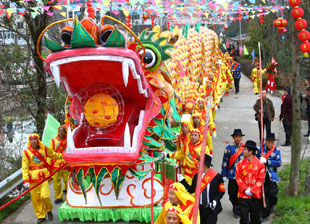 68米“鳌江大龙”闹新春
68米“鳌江大龙”闹新春  北京:罕见病患者“eye show”迎“国际罕见病日”
北京:罕见病患者“eye show”迎“国际罕见病日” 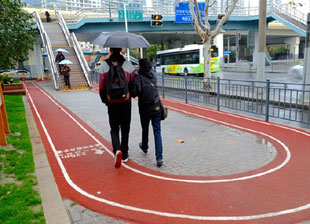 450米健身步道亮相上海闹市
450米健身步道亮相上海闹市
 “最美洗脚妹”的两会声音
“最美洗脚妹”的两会声音 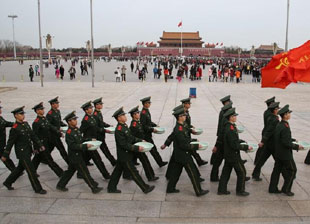 数百名武警携脸盆抹布清洗天安门广场
数百名武警携脸盆抹布清洗天安门广场 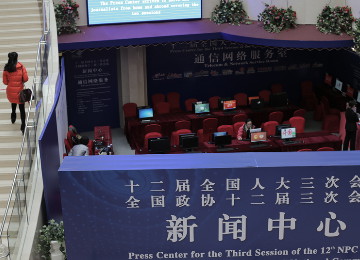 2015两会新闻中心今日正式启用
2015两会新闻中心今日正式启用 边防官兵极寒天气赤膊浴雪 血性十足“虎”啸雪域边关
边防官兵极寒天气赤膊浴雪 血性十足“虎”啸雪域边关  广西“铁骑大军”节后启程返城务工
广西“铁骑大军”节后启程返城务工 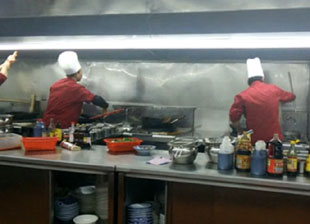 学生某餐厅打工曝黑幕:厨师用炒锅洗拖把
学生某餐厅打工曝黑幕:厨师用炒锅洗拖把
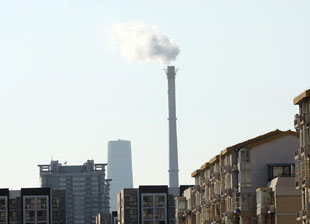 北京长安街最后一根烟囱年内将熄火
北京长安街最后一根烟囱年内将熄火  全国各地新春招聘忙
全国各地新春招聘忙 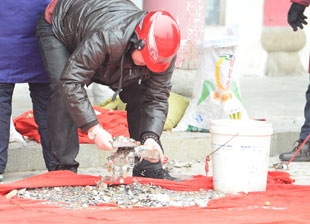 香客在武汉寺庙祈福扔硬币 工作人员戴头盔清理
香客在武汉寺庙祈福扔硬币 工作人员戴头盔清理 天南地北“网购”生活
天南地北“网购”生活  黄河壶口瀑布水量大增吸引观瀑者
黄河壶口瀑布水量大增吸引观瀑者 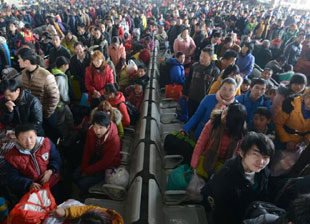 春运大潮:各地迎来返程客流高峰
春运大潮:各地迎来返程客流高峰
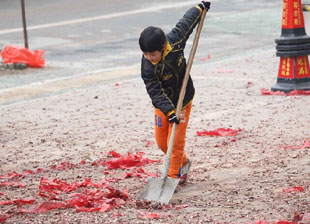 9岁男孩替抱病保洁员妈妈清扫爆竹屑
9岁男孩替抱病保洁员妈妈清扫爆竹屑 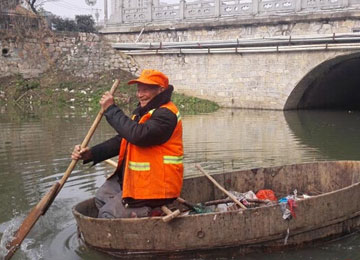 【新春走基层】春节里那抹橘红的风景线(组图)
【新春走基层】春节里那抹橘红的风景线(组图) 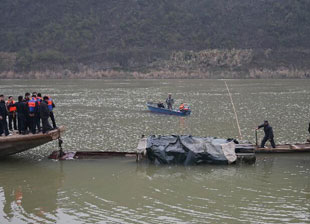 湖南一家18口借船出游发生事故 8人遇难1人失踪
湖南一家18口借船出游发生事故 8人遇难1人失踪

